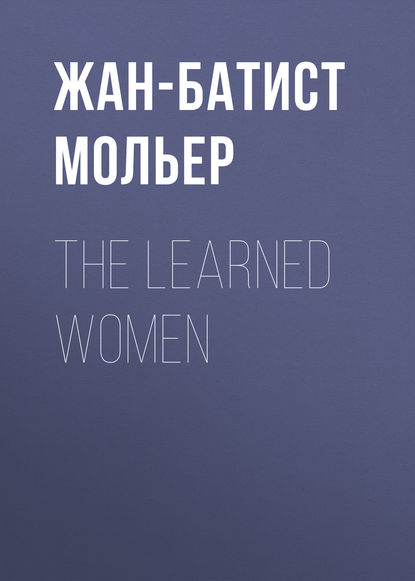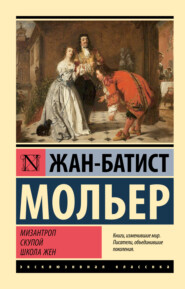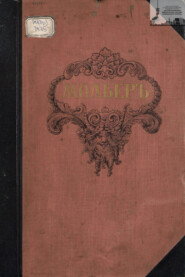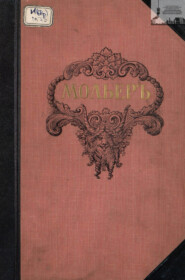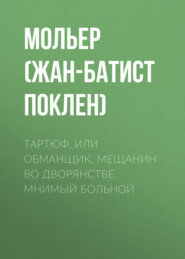По всем вопросам обращайтесь на: info@litportal.ru
(©) 2003-2024.
✖
The Learned Women
Год написания книги
2017
Настройки чтения
Размер шрифта
Высота строк
Поля
CHRY. (to MARTINE). How the deuce! you jade. (To
PHILAMINTE) What! has she…?
PHI. She has with unparalleled impudence, after thirty lessons, insulted my ear by the improper use of a low and vulgar word condemned in express terms by Vaugelas. [Footnote: The French grammarian, born about 1585; died 1650.]
CHRY. Is that…?
PHI. What! In spite of our remonstrances to be always sapping the foundation of all knowledge – of grammar which rules even kings, and makes them, with a high hand, obey her laws.
CHRY. I thought her guilty of the greatest crime.
PHI. What! You do not think the crime unpardonable?
CHRY. Yes, yes.
PHI. I should like to see you excuse her.
CHRY. Heaven forbid!
BEL. It is really pitiful. All constructions are destroyed by her; yet she has a hundred times been told the laws of the language.
MAR. All that you preach there is no doubt very fine, but I don't understand your jargon, not I.
PHI. Did you ever see such impudence? To call a language founded on reason and polite custom a jargon!
MAR. Provided one is understood, one speaks well enough, and all your fine speeches don't do me no good.
PHI. You see! Is not that her way of speaking, don't do me no good!
BEL. O intractable brains! How is it that, in spite of the trouble we daily take, we cannot teach you to speak with congruity? In putting not with no, you have spoken redundantly, and it is, as you have been told, a negative too many.
MAR. Oh my! I ain't no scholar like you, and I speak straight out as they speaks in our place.
PHI. Ah! who can bear it?
BEL. What a horrible solecism!
PHI. It is enough to destroy a delicate ear.
BEL. You are, I must acknowledge, very dull of understanding; they is in the plural number, and speaks is in the singular. Will you thus all your life offend grammar? [Footnote: Grammaire in Molière's time was pronounced as grand'mère is now. Gammer seems the nearest approach to this in English.]
MAR. Who speaks of offending either gammer or gaffer?
PHI. O heavens!
BEL. The word grammar is misunderstood by you, and I have told you a hundred times where the word comes from.
MAR. Faith, let it come from Chaillot, Auteuil, or Pontoise, [Footnote: In Molière's time villages close to Paris.] I care precious little.
BEL. What a boorish mind! Grammar teaches us the laws of the verb and nominative case, as well as of the adjective and substantive.
MAR. Sure, let me tell you, Ma'am, that I don't know those people.
PHI. What martyrdom!
BEL. They are names of words, and you ought to notice how they agree with each other.
MAR. What does it matter whether they agree or fall out?
PHI. (to BÉLISE). Goodness gracious! put an end to such a discussion. (To CHRYSALE) And so you will not send her away?
CHRY. Oh! yes. (Aside) I must put up with her caprice, Go, don't provoke her, Martine.
PHI. How! you are afraid of offending the hussy! you speak to her in quite an obliging tone.
CHRY. I? Not at all. (In a rough tone) Go, leave this place. (In a softer tone) Go away, my poor girl.
SCENE VII. – PHILAMINTE, CHRYSALE, BÉLISE
CHRY. She is gone, and you are satisfied, but I do not approve of sending her away in this fashion. She answers very well for what she has to do, and you turn her out of my house for a trifle.
PHI. Do you wish me to keep her for ever in my service, for her to torture my ears incessantly, to infringe all the laws of custom and reason, by a barbarous accumulation of errors of speech, and of garbled expressions tacked together with proverbs dragged out of the gutters of all the market-places?
BEL. It is true that one sickens at hearing her talk; she pulls Vaugelas to pieces, and the least defects of her gross intellect are either pleonasm or cacophony.
CHRY. What does it matter if she fails to observe the laws of Vaugelas, provided she does not fail in her cooking? I had much rather that while picking her herbs, she should join wrongly the nouns to the verbs, and repeat a hundred times a coarse or vulgar word, than that she should burn my roast, or put too much salt in my broth. I live on good soup, and not on fine language. Vaugelas does not teach how to make broth; and Malherbe and Balzac, so clever in learned words, might, in cooking, have proved themselves but fools. [Footnote: Malherbe, 1555-1628; Balzac, 1594-1654.]
PHI. How shocking such a coarse speech sounds; and how unworthy of one who calls himself a man, to be always bent on material things, instead of rising towards those which are intellectual. Is that dross, the body, of importance enough to deserve even a passing thought? and ought we not to leave it far behind?
CHRY. Well, my body is myself, and I mean to take care of it; dross if you like, but my dross is dear to me.
BEL. The body and the mind, brother, exist together; but if you believe all the learned world, the mind ought to take precedence over the body, and our first care, our most earnest endeavour, must be to feed it with the juices of science.
CHRY. Upon my word, if you talk of feeding your mind, you make use of but poor diet, as everybody knows; and you have no care, no solicitude for…
PHI. Ah! Solicitude is unpleasant to my ear: it betrays strangely its antiquity. [Footnote: Many of the words condemned by the purists of the time have died out; solicitude still remains.]
BEL. It is true that it is dreadfully starched and out of fashion.
CHRY. I can bear this no longer. You will have me speak out, then? I will raise the mask, and discharge my spleen. Every one calls you mad, and I am greatly troubled at…
PHI. Ah! what is the meaning of this?
CHRY. (to BÉLISE). I am speaking to you, sister. The least solecism one makes in speaking irritates you; but you make strange ones in conduct. Your everlasting books do not satisfy me, and, except a big Plutarch to put my bands in [Footnote: To keep them flat.], you should burn all this useless lumber, and leave learning to the doctors of the town. Take away from the garret that long telescope, which is enough to frighten people, and a hundred other baubles which are offensive to the sight. Do not try to discover what is passing in the moon, and think a little more of what is happening at home, where we see everything going topsy-turvy. It is not right, and that too for many reasons, that a woman should study and know so much. To form the minds of her children to good manners, to make her household go well, to look after the servants, and regulate all expenses with economy, ought to be her principal study, and all her philosophy. Our fathers were much more sensible on this point: with them, a wife always knew enough when the extent of her genius enabled her to distinguish a doublet from a pair of breeches. She did not read, but she lived honestly; her family was the subject of all her learned conversation, and for hooks she had needles, thread, and a thimble, with which she worked at her daughter's trousseau. Women, in our days, are far from behaving thus: they must write and become authors. No science is too deep for them. It is worse in my house than anywhere else; the deepest secrets are understood, and everything is known except what should be known. Everyone knows how go the moon and the polar star, Venus, Saturn, and Mars, with which I have nothing to do. And in this vain knowledge, which they go so far to fetch, they know nothing of the soup of which I stand in need. My servants all wish to be learned, in order to please you; and all alike occupy themselves with anything but the work they have to do. Reasoning is the occupation of the whole house, and reasoning banishes all reason. One burns my roast while reading some story; another dreams of verses when I call for drink. In short, they all follow your example, and although I have servants, I am not served. One poor girl alone was left me, untouched by this villainous fashion; and now, behold, she is sent away with a huge clatter because she fails to speak Vaugelas. I tell you, sister, all this offends me, for as I have already said, it is to you I am speaking. I dislike to see all those Latin-mongers in my house, and particularly Mr. Trissotin. It is he who has turned your heads with his verses. All his talk is mere rubbish, and one is for ever trying to find out what he has said after he has done speaking. For my part I believe that he is rather cracked.
PHI. What coarseness, O heavens! both in thought and language.
BEL. Can there be a more gross assemblage of corpuscles, [Footnote: A reference to the corpuscular philosophy] a mind composed of more vulgar atoms? Is it possible that I can come from the same blood? I hate myself for being of your race, and out of pure shame I abandon the spot.





